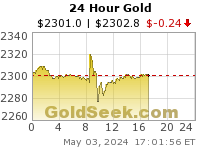By Elliott Wave International
Over the weekend, I went shopping for Halloween decorations. In the store, one of the clerks was wearing a white T-shirt with a puff-paint rendering of the Dow Jones Industrial Average. The line representing prices was the color of blood red, dripping and splashed across the front. When I asked him what it was, he said "the October Curse."'Tis the season of stock market adages; those age-old Wall Street platitudes that claim stock prices perform a certain way during certain months of the year. The problem is, such correlations are hardly a guarantee.
Take October, for example. Yes, this month has marked some of the darkest periods in stock market history: 1929, 1987 and on. Historically, however, it's not the worst performing month. For example, the supposed "Halloween Jinx" failed to bring a deathly pallor to stocks in 2008, as the final days of that year's October saw the biggest weekly gain since 1974.
Remove Dangerous Mainstream Assumptions from Your Investment Process. Elliott Wave International's FREE 118-page Independent Investor eBook shows you exactly what moves markets and what doesn't. It will change the way you invest forever. Click here to learn more and download your free, 118-page ebook.
Then there are these familiar saws of seasonal wisdom:"As Goes The First Week of January, So Goes The Month"-- In the first week of January 2010, the stock market enjoyed a powerful winning streak. Yet, by the end of the month, prices were back in the red, circling the drain of a two-month low.Bottom line: Don't "buy" your trading strategy before the trend actually arrives. The choice comes down to old adages, or objective analysis. Pick the latter.
"Sell In May And Go Away" -- And don't come back 'till St. Leger's Day (September). If investors heeded this wisdom this year, they would have missed one of the strongest uptrends in stocks of the entire year from July to September.
"September Curse" -- If you think October is supposed to be bad, September is widely assumed to take the financial killing cake. Yet this year, U.S. stocks enjoyed their strongest September in 71 years!
Remove Dangerous Mainstream Assumptions from Your Investment Process. Elliott Wave International's FREE 118-page Independent Investor eBook shows you exactly what moves markets and what doesn't. It will change the way you invest forever. Click here to learn more and download your free, 118-page ebook.


沃伦•巴菲特:
ReplyDelete我有一个伟大的老师,大约60年前,他交给我一个重要的原则,从那以后我就一直在实践这个原则。我很幸运,在投资方面我对情绪有很好的掌控力,但是我并没有所谓的投资秘诀。我仔细地考察那些企业,试图弄清楚哪些企业是我了解的,哪些是我不了解的。如果不了解,我就放弃。我需要分析一个企业的前景,并且在价位合适的时候购买他的骨牌,并长期持有,实际就是这么简单。
沃伦•巴菲特:
ReplyDelete他教会了我首要的就是不要把股票看成是一个不停上下浮动的东西,不能轻信一些谣言,不能根据谣言判断一只股票真实的价值。买一只股票就意味着投资于一家企业,而自己就相当于是这个企业长期的伙伴,而且你投资的企业应该在他的领域具有优势,从而能够保证企业在一定时期内维持较好的利润。而且他交给我说不要过分地关注你的投资,如果你遵从格林厄姆先生的教导,然后你会发现你的投资几乎是很难赔钱的。短期来看可能有些人比你赚的钱要多,但是只要你不赔钱,你的回报是持续且合理的,所以我听从我老师的教导,查理•芒格也是这样。
沃伦•巴菲特:
ReplyDelete操作股票的第一大原则就是你要把股票当成一个生意来看,而不要把它仅仅看成是一种上下浮动的有价证券。第二个就是边际效益安全的理念。如果你认为一只股票值十块钱,那么九块五或者是九块七毛五都不要买,你要等价格比你的心理价格低很多的时候再买入。如果一座桥他的载重量是一万吨,那你就不要驾驶一辆9800吨的卡车从上面经过,但是你可以驶过一座承重量两万吨的桥,这就是一个格林厄姆一个基本的理念。
沃伦•巴菲特:
是的,芒格是我的秘密武器。他会指出我的错误所在,因为我经常犯错,他很早的时候就告诫我说,不要因为一只股票的帐面便宜就去购买,更重要的是要看到这个企业业务的基础是好的,是可持续的。所以在遇到查理•芒格之后我对格林厄姆老师交给我的理念在实践应用中做了一些修正。我们现在会以合理的价格购买非常优秀公司的股票,而不是以超低的价格买一个平庸公司的股票。
沃伦•巴菲特:
ReplyDelete芒格先生和我,尤其是我本人,在自己做企业的过程中学到了很多东西,我们做投资之所以成功,是因为我们懂得怎么做生意,而我们的生意做的成功,是因为我们懂得投资。我们将这两种行为有效地连接贯通,我们知道价值是怎样创造出来的,如果不是我们同时既做投资又管理着自己的企业,我们是不可能对两者有如此深刻的见解。有些时候我们从糟糕的商业运作中吸取教训,并且在以后加以摒弃。
沃伦•巴菲特:
ReplyDelete芒格和我一直在观察汽车这个行业,我们观察了50年,从这种持续的观察中,我们知道一个汽车公司怎样才能获得成功,又会因为什么走向失败,像比亚迪这样的一家企业其实在汽车行业是不多见的,一些IT或者高科技的股票可能一度非常成功,但是我们却做不到持续有地去检测他们。比如说苹果公司很成功,但是我们并不是很懂这家公司,或者在这个领域中的其他公司。但是可口可乐我就看得懂,我知道像可口可乐这样的公司在未来很多年它都不可能出现什么问题,它明年卖的产品肯定比今年还多,在全球也不会有价格战,也不会缺原材料,所以在世界上人们总是要喝饮料的,饮料总是一种必需品,所以我们看得懂可口可乐的未来,我们就要购买他的股票。而对于比亚迪,我想我们也很确定。
Well, you can not predict the market,but in the long run,the value of a firm in the market will tend to approximate its ture economy value, and so Warren's brilliance is that he understand, he looks the business and he can get a sense of what the profit stream of that business will be, not exactly but within a range. And so I know way less about markets than Warren does, and yeah, even I know there are unpredictable. The long run is to be smart about businesses not, not really the market.
ReplyDelete